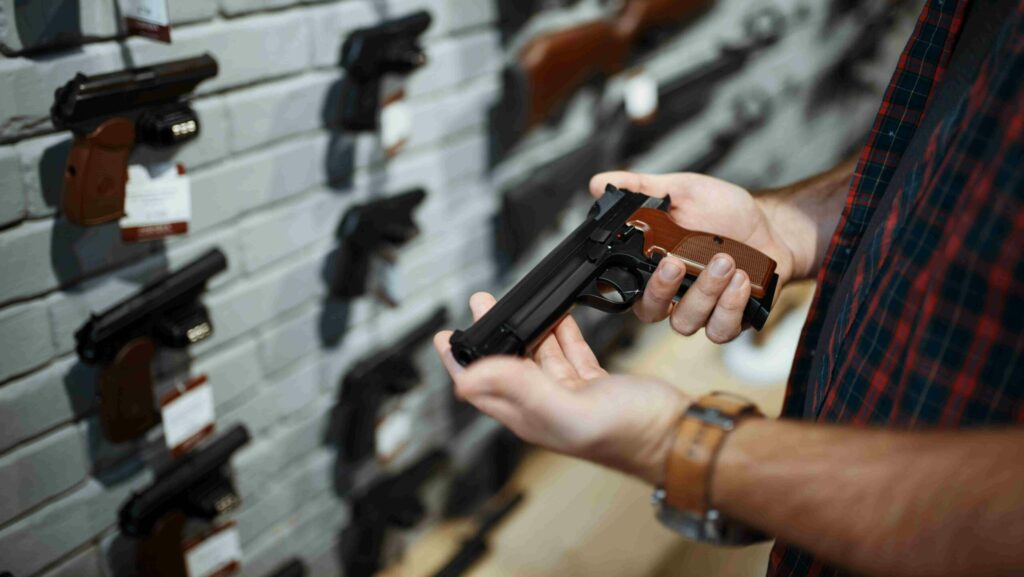The Importance of Identity Verification for Gun Purchases in the U.S.
While the right to bear guns is written in the U.S. Constitution, responsible gun ownership is essential to ensure that this right does not come at the cost of safety. A key aspect of this responsibility is tying an individual’s identity securely to any gun purchase. Identity verification and background checks play a crucial role in preventing firearms from slipping into the wrong hands, such as those with criminal records or other disqualifying criteria. In this blog, we will explore the requirements of firearm transactions, discuss the current landscape of gun ownership in the United States, and explain how verification solutions can help ensure that guns are sold only to responsible and eligible individuals.
Guns in the States
According to a survey conducted by the Pew Research Center in June 2023, about 4 in 10 adults in the U.S. say they live in a household with a gun, including 32% who say they personally own one. For many, 72%, the ability to own a gun is closely tied to their sense of personal security and freedom. However, with this right comes the responsibility to ensure that firearms are used safely and that they do not pose a threat to others.
Recent years have seen a troubling rise in mass shootings and gun-related incidents across the United States. These tragic events underscore the importance of ensuring that firearms are used safely and do not pose a threat to public safety. In light of these incidents, nearly half of U.S. adults who do not currently own a gun express that they could see themselves owning one in the future, driven by the same motivations of personal security. Yet, this increasing interest in gun ownership must be met with a renewed focus on responsible practices, such as identity verification, to prevent firearms from falling into the wrong hands.
Current Requirements for Buying a Gun in the U.S.
The process of buying a gun in the U.S. varies depending on the state, but federal law sets some baseline requirements:
Background Checks
In 2024, the federal Bureau of Alcohol, Tobacco, Firearms and Explosives (ATF) introduced a new rule requiring more unlicensed gun sellers to obtain dealer licenses. This change means that more gun buyers will need to pass background checks, reducing the likelihood of firearms ending up in the wrong hands. This rule is expected to have a significant impact on gun sales at events like gun shows and in online marketplaces.
However, federal law still allows many sellers to operate without a license and without conducting background checks, leaving a loophole that can be exploited by individuals who are prohibited from owning guns.
The online firearm marketplace poses a challenge to safety efforts. Every year, over one million ads are posted on platforms like Armslist for firearm sales that do not legally require a background check. Investigations have revealed that nearly 1 in 9 individuals attempting to purchase guns from unlicensed sellers online are prohibited from owning firearms. In states where background checks are mandated by law, most sellers comply and require a check before completing a sale. Conversely, in states without such requirements, many sellers openly state that no background check is necessary, potentially providing access to firearms for individuals who should not have them.
Age Restrictions
Federal law mandates that the minimum age to purchase a handgun from a licensed dealer is 21, and 18 for long guns (rifles and shotguns).
Identification Requirements
Buyers must provide valid identification, typically a government-issued ID, to verify their age and residency. However, this step does not always guarantee the legitimacy of the identity. This is due to:
-
- Fake IDs: The identity is non-existent, and the ID may be obtained from illegal sources, often using advanced forgery techniques to create an entirely fake document.
- Altered ID documents: What was originally an authentic ID is tampered with or modified to change details like age or name.
- Identity theft: Genuine identification documents are stolen or borrowed, allowing the fraudster to impersonate the legitimate owner.
To prevent this, entities can use a reference database for manual checking or an automated solution. Reference databases contain verified IDs, including their security features. Staff compare the ID document of the potential buyer with the database, noticing any discrepancies to ensure authenticity.
With an automated solution, it either scans physical IDs using high-resolution scanners or receives digital copies of IDs for analysis. Face recognition technology compares the picture of the customer with the picture on the card to prevent identity theft or using stolen IDs. Within seconds, the result of the check will be generated.
ID verification in firearm transactions is critical for ensuring that the buyer is who they claim to be. It verifies the individual meets the legal age requirements and helps avoid fraud, making sure that firearms are sold only to eligible and genuine individuals.
Waiting Periods, Training, and Permits
Some states impose additional regulations, such as waiting periods, mandatory safety training, and the requirement to obtain a permit before purchasing a firearm.
Source: NRA-ILA, 2024.
For more information on firearm legislation by state, go to NRA-ILA | Gun Laws. This website contains detailed information on the regulations and requirements regarding weapon purchases and possession in several states.
Implementing Robust Identity Verification Solutions
Accurate identification verification is required when purchasing firearms to ensure safety and regulatory compliance. Keesing provides advanced solutions to help streamline this procedure securely.
Keesing’s DocumentChecker is a comprehensive reference database to verify the authenticity of identity documents like driver’s licenses and passports. This solution also offers state-specific information, which is essential for following local legislation.
AuthentiScan enhances verification by combining biometric analysis and document checks. Face recognition technology improves security by comparing the customer’s photo to the one on their ID. This technique assures that the individual who presents the identification matches the documented photo, considerably minimizing the danger of identity theft.
Keesing has an optional screening procedure against sanctions lists, ensuring that buyers are not on these lists, which could impair legal compliance and transaction safety.
Interested in exploring and trying out our solutions? You can either click the button below, email us, or call us at +31 (0) 207157825.


